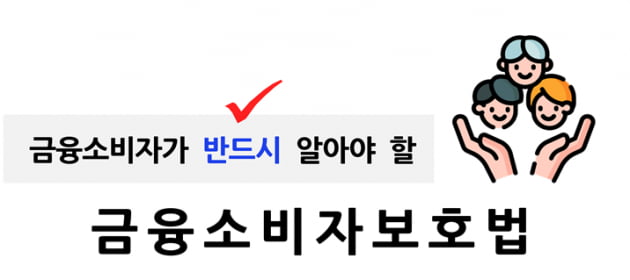
The Financial Consumer Protection Act (the Gold Soap Act), which broadly guarantees consumers the right to terminate illegal contracts and withdrawal of subscription, will take effect from the 25th.
Consumers are free to withdraw their contracts within the period for insurance and loan products excluding guarantee insurance or linked loans, high-level financial investment products, high-level investment discretionary contracts, and some trust contracts.
When selling financial products, financial institutions are obligated to confirm the consumer’s property situation and transaction purpose, recommend suitable and appropriate products, and explain important matters such as the possibility of fluctuations in profits. It is also forbidden to engage in unreasonable solicitations such as tying other products when lending.
If a financial company violates these sales principles, the consumer can exercise the right to terminate the illegal contract for one year from the date of knowledge of the violation or five years from the date of signing the contract, whichever comes first.
There is also a right for consumers to request data from financial companies to respond to dispute settlement and litigation. If the seller has inflicted damage to the customer by violating the duty of explanation, the seller, not the customer, is liable to prove the existence of intention or negligence. The responsibility for proving damages is shifted.
The following are the main questions and answers.
△Can a consumer request termination of the contract if a financial company violates the sales principle prescribed by law?
-Yes. You can exercise the right to terminate the illegal contract within one year from the date the consumer becomes aware of the violation or within five years from the date of signing the contract. You can exercise your rights by submitting a contract request form to a financial company, attaching the facts of the violation and supporting data.
Financial companies must notify whether or not they accept the contract within 10 days from the date of receipt of the contract termination request, and if they accept the contract termination, the consumer can terminate the contract without any costs related to termination.
△ Is it possible to withdraw the product after signing up?
-Yes. Insurance products can be withdrawn on the first date of 15 days from the date of receipt of the insurance policy or 30 days from the date of subscription. Investment products are 7 days from the contract conclusion date, and loan products are 14 days from the contract conclusion date.
Consumers must send written messages, e-mails, and smart phone text messages to financial companies to indicate their intention to withdraw and notify the financial companies of the sending without delay.
△ What should I do if a dispute arises due to a financial transaction?
-You can apply for dispute settlement with the Financial Supervisory Service. You can apply for dispute mediation through the FSS homepage, mail, or visit the FSS. Consumers may request access to data maintained and managed by financial companies for the purpose of responding to disputes and litigation.
△ What should I do if I have questions about the law of prohibition?
-The Geumso Act consists of the law, enforcement decree (presidential decree), supervisory regulations, and detailed enforcement regulations. Therefore, in order for consumers to accurately understand the prohibition law, they must look at both the law and its sub-regulations. It can be found at the Financial Supervisory Service Financial Supervisory Regulation Information System and the National Law Information Center.
△Can I do financial transactions with confidence if I only have the gold law?
-Not like that. Consumers also need to confirm that the financial company they intend to do business with is registered and licensed. In addition, it is necessary to check important transaction matters such as whether the product to be traded is suitable for the transaction purpose, transaction cost, and risk of loss.
When making financial transactions, the person himself/herself must check the contents and sign the documents himself. Contract details, such as contracts and product descriptions, should also be kept.
Song-ryul Lee, reporter of Hankyung.com [email protected]
